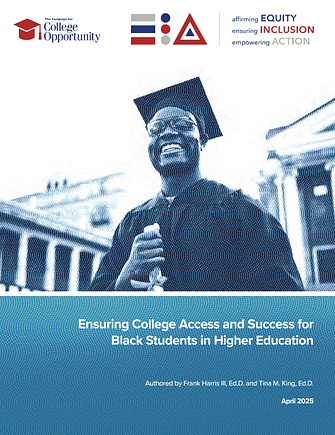
Ensuring College Access and Success for Black Students in Higher Education
Download the publication
Accounting for 14% of the population of the United States today, Black Americans are integral to the social, cultural, economic, and political fabric of the United States. Black Americans have long regarded a college education as a core pathway to full and equitable participation in American society. Yet, the enduring legacy of racism has not only resulted in limited support for their capacity to create generational wealth and access economic mobility, but also support to access and succeed in higher education.
We are proud to release Ensuring College Access and Success for Black Students in Higher Education, authored by Dr. Frank Harris, III, Professor of Postsecondary Education and Co-Director of the Community College Equity Assessment Lab at San Diego State University, and Dr. Tina King, President of San Diego College of Continuing Education, as a part of our Equity, Inclusion, Action initiative.
The country is at a defining moment marked by the end of race-conscious college admissions; attacks on diversity, equity, and inclusion initiatives; an escalating college affordability crisis; and other barriers that seek to limit fair and equitable opportunity to higher education for historically underserved students. Black students face additional barriers to their belonging in higher education, including racism, growing mental health needs, a lack of representation in leadership and faculty, and more. This timely publication calls on policymakers and education leaders to implement the proven and innovative policies and practices necessary to eliminate these barriers and support Black students to equitably access and succeed in higher education, growing America’s multiracial democracy and economy with their talents.
Achieving a society that has eradicated discrimination on all levels requires strengthening higher education as a pathway to full and equitable participation in our society for historically marginalized groups, particularly Black Americans. The authors additionally spotlight exemplar programs and organizations across the country that invest in Black student supports, including Sacramento State University and Compton College, addressing factors from food insecurity to college leadership development and beyond.